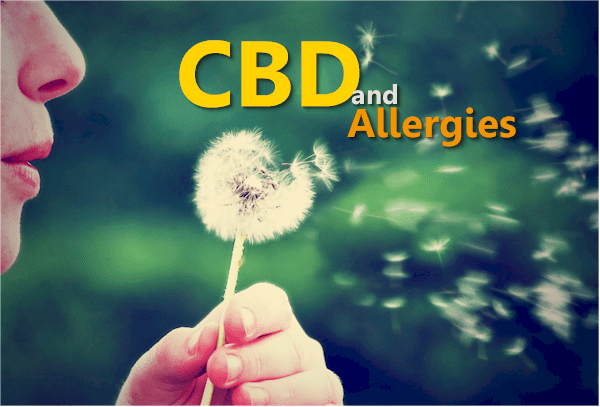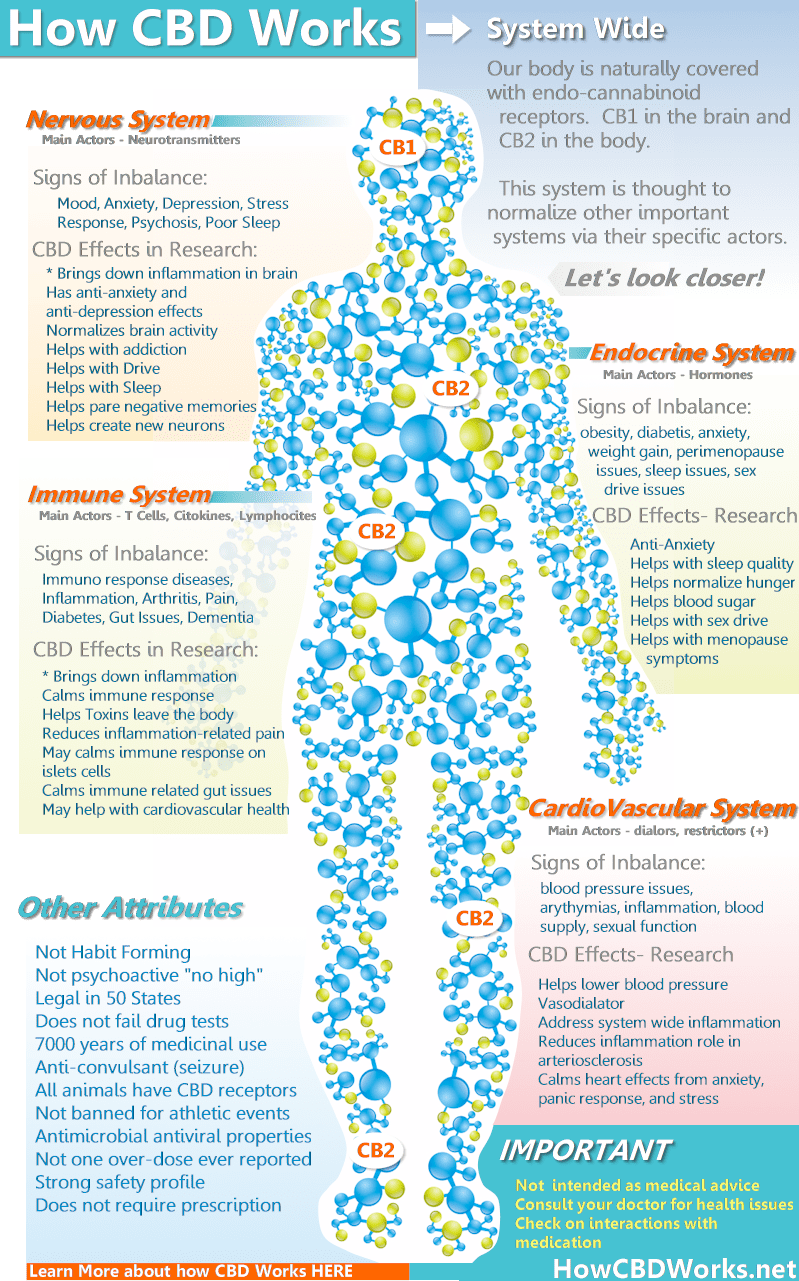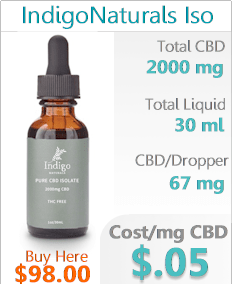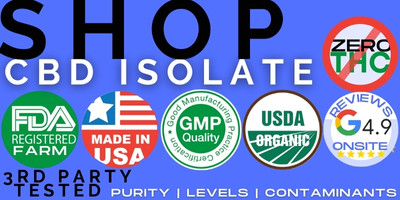CBD Research - How CBD Works

HOW DOES CBD WORK FOR HISTAMINES AND ALLERGIES
Okay...it's totally anecdotal.
When I take CBD isolate (not full spectrum), my entire sinuses clear right up.
In minutes!!
That's not even why I'm taking CBD but what a side effect.
Turns out that there is quite a bit of research to back CBD's effect on allergies and not a minute too soon.
More than half of the US reports having allergies.
The numbers for women go even higher!
Yes, higher than 1/2. That's a lot.
There's an interesting tie with estrogen which we'll discuss below.
So...what if we could help reduce the stats in the US:
- 15 million+ doctor and hospital visits
- More than $100 billion in related costs (including food, asthma, and other allergies)
- 6th leading cause of chronic health issues
Maybe more alarming is the trend line.
In children alone...
- Skin allergies increased 50% in a 10-year duration
- Food allergies increased by almost 70%
This was from roughly 1998-2008.
The trend has only accelerated since then.
Something is going on.
We'll get into that as well.
Most importantly, we'll see what research is showing on CBD and Allergies and Histamines.
Finally (and this is a big one), we'll talk about why your choice of CBD may actually cause more harm than good for allergies and histamines.
Enough talk. Springtime's coming...eventually.
You can jump right to the CBD comparison by price and safety here:

Or jump to any area here:
- A quick update on allergy and histamine research
- Why is our immune system in revolt?
- Endocannabinoid system and the allergies and histamines
- CBD and allergies or histamines – based on research
- The full spectrum versus CBD isolate connection with allergies and histamines
- How much CBD to take for allergies or histamines
- Best CBD to take for allergies and histamines
Let's get to it.
A Quick Update On Allergy And Histamine Research
Allergies can display themselves in many ways:
- Sneezing
- Itchy skin and eyes
- Swelling
- Redness
- Hives
Is this all the result of one thing in the body?
Pretty much.
It's your immune system going haywire.
We'll start with the basics and then get into some interesting thoughts on why allergies
are just one sign of our modern world's health crisis.
Here's the basic mechanism we'll keep track of for later.
When the body comes in contact with a foreign entity (pollen, food, medication, bee sting, etc), the immune system jumps into gear.
It has to quickly determine if the foreign entity is no big deal or a threat to our very survival.
It's doing this billion of times a day across the entire body.
It works primarily where we come in contact with the outside environment.
Most of this is the skin, the gut, and the mouth/nasal passages.
The immune system really resides in the gut which is critical for later.
With an allergic reaction, the immune system triggers mast cells to release histamine.
Histamine is at the heart of the symptoms of allergies.
Basically, histamine's job is to get those allergens (pet hair, pollen, food, etc) out of you as quickly as possible.
Usually, this is through the skin or digestive tract.
Hence the watery eyes, sneezing, coughing, etc.
Histamine creates inflammation at the site which signals the immune system to send repair chemicals.
That's your swelling, redness, and more.
Some foods are naturally high in histamines as well.
In fact, a percentage of the population has histamine intolerance which usually means that their DAO pathway is impaired.
DAO is the genetic and chemical pathway that breaks down histamines once the threat is over.
This may be you if you have typical allergic reactions to the following:
- Alcohol
- Pickled or canned foods – sauerkraut
- Matured cheeses
- Smoked meat products – salami, ham, sausages.
- Shellfish
- Beans – chickpeas, soybeans, peanuts
- Nuts – walnuts, cashew nuts
- Chocolates and other cocoa-based products
- Vinegar
- Ready meals
- Salty snacks, sweets with preservatives and artificial colorings
Learn more here:
DAO primarily resides in the gut so that's going to be a key place to look in terms of allergies.
There's a great review on histamine intolerance here:
Oh...and as for that bee sting??
There's histamine actually in the venom!!
It's a common tool used by the plant and insect world for protection.
Don't eat me or you'll get a nasty response.
So...those are the basics of the allergic response and histamine release.
- Why is it on the upswing?
- Why in the developed world?
Now it's getting interesting.
Why Is Our Immune System In Revolt
Allergies are the result of the immune system over-reacting to pretty safe foreign bodies (pollen, pet dander, peanuts, etc).
Why?
First some interesting stats:
- The growth in allergies has occurred primarily in the developed or "Western" world
- A corresponding increase in autoimmune diseases also follows this pattern
- Being raised with animals reduces the chances of allergies later in life
- Kids raised on farms are less likely to have allergies.
- Babies born by Caesarian section have an increased risk for asthma and allergies
All this points to the hygiene theory.
We're just too clean early in life.
The immune system is not trained correctly and over-reacts.
This isn't dogma yet in the scientific community but the above points (and others) definitely point to something there.
Let's dig deeper.
All the new research is on the microbiome.
The collection of helpful (and in some cases, essential) gut bacteria that almost act a separate organ for us.
They are integrally tied into our immune system which shares a residence with them in the gut.
You can learn more about CBD and the Gut here.
These "good" bacteria may hold the key to allergies and histamine response.
A simple example...
Kids who get antibiotics in the first year of their life have higher rates of asthma:
From the same article, scientists then went on to narrow down the effects to 4 different strains of gut bacteria with a profound impact on asthma.
They could even add these back to bacteria-free mice to instill the protection!
A fascinating read.
Having antibiotics in the first 3 months of life can have a significant impact on allergies later in life!
The ties go on and on:
- Babies born vaginally have reduced risk for allergies
- People switched to plant-based diets has reduced markers for allergy sensitivity after gut biome changes
- Mice exposed to dog dander had a suppressed response to allergies
There is a huge amount of data on this phenomenon and it all comes down to our microbiome.
Possibly the greatest influence on all our modern diseases...Bar NONE.
Check out CBD and probiotics for anxiety to see just one critical pathway.
Before we get into the endocannabinoid system, how is the microbiome doing these days?
Not good!!
We are swimming in a sea of microbiome weakeners if not outright killers:
- Antibiotics
- Food preservatives
- Artificial sweeteners, flavors, and chemicals
- Pesticides
The use of all has increased significantly in the last 40 years.
As have allergies!
The immune system is either not being exposed early on to sufficient "training" bacteria and/or the immune system is not functioning correctly under the weight of chemical exposure.
The latter is summarized in the NIH study below:
Atopy and asthma appear to have their roots in insufficiency of early life exposure to the diverse environmental microbiota
A simple but powerful example.
It was known in England when smallpox was ravishing the country (and continent) that milkmaids never got it.
Cows have their own version of "pox"...cowpox. Lucky them.
Scientists intuited that exposure to the cowpox was somehow protecting the milkmaids from smallpox.
They tested their theory or prisoners (or be executed) by applying cowpox puss to open cuts in the prisoner.
They got sick but recovered.
They then were "vaccinated" from smallpox.
The word vaccine comes from the Latin word for cow.
You can read all about the wondrous immune system in Daniel Davis' "The Beautiful Cure".
Fascinating read.
You can learn all about the microbiome and allergies here:
And here:
There's so much research on the microbiome and allergies...we'd never get to anything else.
So...let's eventually get to CBD and allergies.
First...the system it operates in!
Endocannabinoid System And The Allergies And Histamines
Everybody has an endocannabinoid system that spans major systems and almost all cell types.
We share this system with most multi-cellular creatures all the way down to sea urchins.
It's approximately 600 million years old.
Here's a quick image:

The endocannabinoid system is tasked with balancing key systems:
- The immune system (inflammation and immune response)
- The endocrine system (hormones)
- The nervous system (neurotransmitters)
Obviously, the immune system is key to our discussion of allergies.
Our innate immune system has its own endocannabinoids at work.
Anandamide and 2-AG are the dominant ones.
Early signs of a connection between the endocannabinoid system and allergies were found in animal studies.
For example, mice which are lacking CB1 and CB2 receptors had heightened allergic reactions:
In an animal model for cutaneous contact hypersensitivity, we show that mice lacking both known cannabinoid receptors display exacerbated allergic inflammation.
Remember the mast cells discussed before...the arbiters of our body's reaction to allergens??
The activation of CB2 receptors on mast cells has direct anti-inflammatory effects, causing the decreased release of pro-inflammatory mediators by these cells.
In terms of Asthma, the endocannabinoid system appears crucial in regulating smooth muscle response.
The activation of CB1 receptors on bronchial nerve endings has bronchodilator effects by acting on the airway smooth muscle and may be beneficial in airway hyperreactivity and asthma.
This is also critical to blood pressure and other bodily functions.
More to the point, by stimulating or inhibiting the endocannabinoid receptors, mast cell activity can be directly affected:
It has been shown that CB1 and CB2 on MCs have anti-inflammatory effects. CB1 downregulates MC degranulation, while CB2 downregulates the release of pro-inflammatory mediators.
It's the biological equivalent of the smoking gun!
Let's introduce one other character...IgE or Immunoglobin E. This is one of the actual chemicals released by mast cells that causes all the symptoms with allergies.
The endocannabinoid system is directly involved in calming this response:
Cannabinoid 2 (CB2) receptor involvement in the down-regulation but not up-regulation of serum IgE levels in immunized mice.
In general, the system appears to be integral to bringing the immune response "threat level" from T1 to T2.
T1 is where the allergy "hyper-active" response occurs.
Okay...the endocannabinoid system is intimately involved in the allergic response within the body.
What about CBD?
CBD And Allergies Or Histamines – Based On Research
CBD is an external cannabinoid found in the cannabis plant.
It and THC are the two largest by volume.
Unlike THC, CBD is not psychoactive and shows many positive results throughout the body.
You can see all the research and articles on THC versus CBD here.
CBD has shown great promise as being an anti-inflammatory both through the body and more importantly, in the gut.
You can learn all about CBD and inflammation here or CBD and the Gut here.
We'll skip those aspects and dive right into its effects specifically on allergies.
We'll have an entire article on CBD and Asthma but a quick take-away.
Cannabidiol reduces airway inflammation and fibrosis in experimental allergic asthma.
The key takeaway...
CBD treatment decreased the inflammatory and remodeling processes in the model of allergic asthma.
Lungs. Check.
Let's move on to skin, a source of much allergic suffering.
It's not easy reading but the result of this study is that CBD reduced the various chemical messengers of allergies:
CBD elevates the levels of AEA and dose-dependently inhibits poly-(I:C)-induced release of MCP-2, interleukin-6 (IL-6), IL-8, and tumor necrosis factor-α
This is the first demonstration of the anti-inflammatory properties of CBD in an experimental model of ACD.
ACD is not the heavy metal band sans one letter but short for Allergic Contact Dermatitis.
Because allergic skin reaction is just too plain!
Keep in mind that the allergic response across the body uses the same if not an identical pathway.
Whether it's runny noses, skin rashes, or closing airways, the underlying pathway is the same.
The immune system triggers mast cells. Mast cells release inflammatory chemicals.
Based on the research above, CBD appears to balance the body's response at each level:
- The immune response is taken out of hyper-active response (from T1 to T2)
- Mast cells activation is calmed down
- Inflammatory chemical levels are reduced.
It's the trifecta of allergic response!
You can in-depth information here:
Is CBD high in histamines?
Can you be allergic to CBD?
Let's look at one other important aspect of what type of CBD might be best if you have allergic and histamine issues!
The Full Spectrum Versus CBD Isolate Connection With Allergies And Histamines
There's a great deal of froth over "full-spectrum" CBD.
Essentially, it's CBD with more of the plant material from hemp left in the mix.
Except for THC which has to be under .3%. Usually. Some full spectrum still has traces of THC.
Look at almost every website that talks about CBD.
Inevitably, they'll drop the "entourage effect" on you.
This is akin to cannabis' "Just Do It" moment.
It sounds so good!
Marketing genius.
But is it real?
You can read all about full spectrum versus CBD isolate (what all this research is based on) here.
The net net in terms of allergies and histamines?
If you are sensitive to allergens, having all that plant material can actually cause a negative response.
Our gut says that the "side effects" of CBD are actually in response to the full spectrum plant material.
Anecdotally, many people have confirmed this with their response to full-spectrum and then CBD isolate (by itself).
.
Try isolate first to see your body's allergic and histamine response.
Do this for at least 1 month or a full bottle of a higher CBD mg level (2000+)
You can then try full spectrum to see if there's a difference.
If allergies and histamines are the intended target, let's not add additional allergens in the form of plant material to the mix!
Also, full spectrum can have up to .3% THC.
This is a small amount but NOT zero!
There's a line of CBD which focuses on CBD isolate for histamine and allergy-sensitive people here.
Some people actually have allergic responses to THC itself!
How Much CBD To Take For Allergies Or Histamines
This partially depends on your intended goal.
If it's mild symptoms of seasonal allergies, 25-30mg per day is a baseline wellness dosage.
It's also a good test dosage to see how your body responds.
For more serious issues, 300-600mg is generally used in research on CBD.
It has been tested up to 1500mg with a strong safety profile.
Check out the CBD dosage page or CBD and safety here.
Best CBD To Take For Allergies And Histamines
There is topical CBD balm but keep in mind, our allergic and histamine response is driven by our immune system.
And that is primarily directed from our gut!
CBD oil is currently the most effective way to treat systemic responses to allergens.
As we mentioned above, we want CBD isolate so as not to put more of a burden on our histamine response.
We definitely want 3rd party tested CBD free of:
- THC free
- Pesticides
- Solvents
- Heavy Metals
- Bacteria
- Mold
The CBD Isolate options by price (IndigoNaturals has free shipping so pricing is equivalent):


You can find a comparison by the price of major CBD brands here.
You can see the safety screened CBD by price value here:
